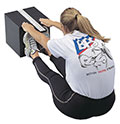Can Fitness Screening be Unbiased?
excerpted from IowaNow 7/22/13 1
 Physical fitness tests that focus on sheer strength and endurance may not be the most accurate ways to determine qualified applicants for physically demanding jobs and may also increase the likelihood of a gender discrimination lawsuit from female applicants, according to new research from The University of Iowa. 2 Physical fitness tests that focus on sheer strength and endurance may not be the most accurate ways to determine qualified applicants for physically demanding jobs and may also increase the likelihood of a gender discrimination lawsuit from female applicants, according to new research from The University of Iowa. 2
The UI research team reviewed 140 past studies of differences in various physical abilities between men and women. Their review showed that men were, indeed, physically stronger than women, but found distinct nuances in other differences.
 For instance, while it found tests that measured brute muscle strength or cardiovascular endurance favored men, the gender gap was significantly less in tests that measured quality of body movement. In fact, for tests measuring flexibility and balance, the difference was essentially zero. For instance, while it found tests that measured brute muscle strength or cardiovascular endurance favored men, the gender gap was significantly less in tests that measured quality of body movement. In fact, for tests measuring flexibility and balance, the difference was essentially zero.
The study suggests that in addition to strength and endurance tests, employers should give tests that measure flexibility, balance, coordination, and other forms of movement quality. It suggests that those tests are strong predictors of performance in physically demanding jobs with results that show little difference between genders.
More than 28% of Americans today work in physically taxing jobs such as law enforcement, firefighting, construction, maintenance, or the military, so fitness screening is an increasingly important part of the hiring process.
1 IowaNow (“Flex plan”) - http://now.uiowa.edu/2013/07/flex-plan 2 “A Meta-analysis of Sex Differences in Physical Ability,” currently in-press at the Journal of Applied Psychology |